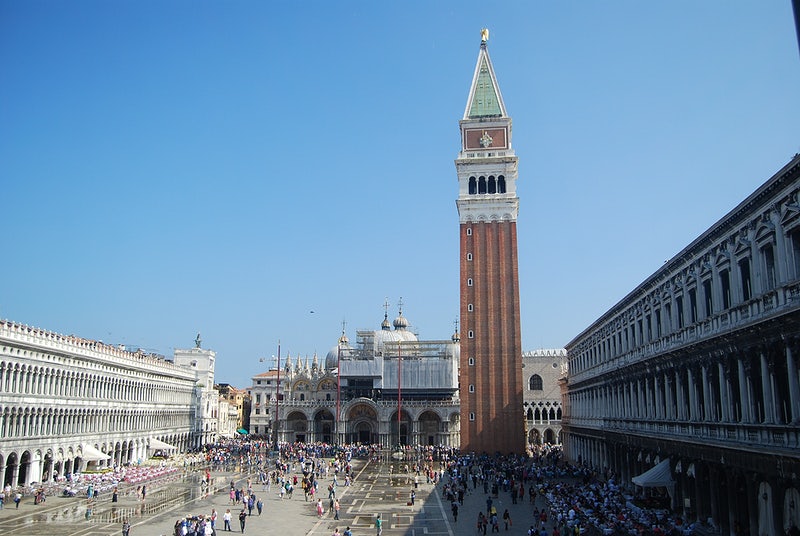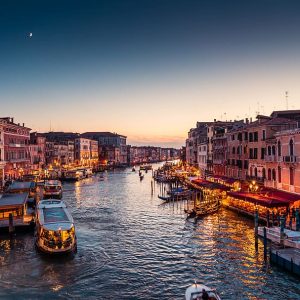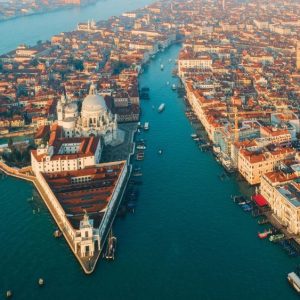The controversial Venice entrance fee for day-trippers is reinstated, with new conditions aimed at better managing visitor numbers. While the charge had little impact on reducing tourist flows last year, officials say the data gathered from the system could prove crucial in developing more targeted strategies to tackle overtourism.
From today, 18 April, visitors entering Venice without an overnight booking will again be required to pay a €5 entrance fee. But this year, there’s a catch; those who fail to book more than three days in advance will pay double.
The revised scheme will now apply to 54 dates, nearly twice the number covered during the initial trial in 2024. The charge is in effect from 8.30am to 4pm, mainly on weekends through to 27 July.
Despite scepticism over its effectiveness in reducing foot traffic – last year saw record visitor numbers – city officials remain optimistic.
77,000 visitors had already booked their entry slot for this year by mid-April, according to Venezia Today. Approximately 8,000 of those are for today.
Aiming for “quality tourism”
Simone Venturini, Venice’s councillor for tourism, described the access fee not as a cure-all, but as “a tangible and innovative tool” that enables authorities to gather objective data on the movements and habits of day visitors. “Our goal is to encourage quality tourism – overnight stays – that respects the city and seeks to engage with it on a deeper level,” he said.
Last year, more than 3.9 million people stayed overnight in Venice’s historic centre. However, the overwhelming majority of the estimated 30 million annual visitors still come just for the day. These short visits often cause congestion at transport hubs and major landmarks, without contributing significantly to the local economy.
Visitors who stay overnight, children under 14, and residents of the Veneto region are exempt from the fee. However, they must still register online. All day-trippers receive a QR code to be shown at entry points, such as Santa Lucia train station, where stewards have been hired to monitor compliance.
City income
Although it’s too early for a full count, more revenue is expected from the Venice entrance fee this year than in 2024. The fee now applies on 54 dates, up from 29, and those booking less than three days before their visit must pay €10 instead of €5.
“This isn’t a cash-grab,” said city councillor Michele Zuin. “Last year, we came up slightly short, spending around €2.7 million while bringing in €2.4 million.” This year, however, officials are anticipating a surplus of €1 to €1.5 million.
The additional funds will be used to help offset utility bills for residents, according to Zuin. “It will become a kind of benefit for Venetians, as compensation for the inconvenience caused by mass tourism.”
Even so, the figure remains modest compared with the €38 million Venice collected from the tourist accommodation tax in 2024.
Some locals unconvinced by the scheme
Not everyone is convinced by the scheme. Local opposition councillor Giovanni Andrea Martini, a long-standing critic of the measure, said, “It has made absolutely no difference. The numbers have actually been increasing.”
Some residents have also expressed frustration at attempts to shift crowds into lesser-known neighbourhoods in an effort to reduce congestion around hotspots like St. Mark’s Square. “It is becoming even more tragic for those who live here,” said Martini.
Others argue that sustainable tourism in Venice will only be achieved through stricter regulation of short-term holiday rentals. They also want investment in services for full-time residents, whose numbers continue to decline. The city’s population dropped below 50,000 in 2022; a symbolic threshold that has deepened the debate over who Venice really belongs to.
While it’s still early days, city officials believe the access fee could become a valuable tool. If used properly, the data could help shape more nuanced policies to balance the needs of visitors and locals alike.





